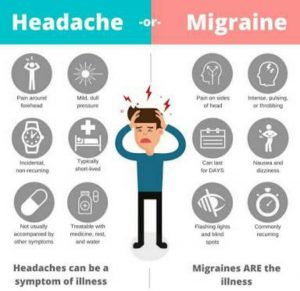Migraine is a neurological disorder characterised by recurrent throbbing pain usually on one side of the head.

Migraine pain:
People describe migraine pain as:
- pulsating
- throbbing
- perforating
- pounding
- debilitating
A migraine usually lasts from four to 72 hours if untreated. The frequency with which headaches occur varies from person to person. Migraines may be rare, or strike several times a month. During a migraine, you may experience:
- Pain on one side or both sides of your head
- Pain that feels throbbing or pulsing
- Sensitivity to light, sounds, and sometimes smells and touch
- Nausea and vomiting
- Blurred vision
- Lightheadedness, sometimes followed by fainting
Migraine triggers:
A number of factors may trigger migraines, including:
- Hormonal changes in women.Women with a history of migraines often report headaches immediately before or during their periods, when they have a major drop in estrogen.
- Some women may experience migraines during pregnancy or menopause.
- Foods: Aged cheeses, salty foods and processed foods may trigger migraines.
- Skipping meals or fasting also can trigger attacks.
- Food additives:The sweetener aspartame and the preservative monosodium glutamate (MSG), found in many foods, may trigger migraines.
- Drinks:Alcohol, especially wine, and highly caffeinated beverages may trigger migraines.
- Stress:Stress at work or home can cause migraines.
- Sensory stimuli.
- Bright lights
- sun glare
- loud sounds
- Strong smells — including perfume, paint thinner
- secondhand smoke and others can trigger migraines in some people.
- Changes in wake-sleep pattern. Missing sleep or getting too much sleep may trigger migraines in some people, as can jet lag.
- Physical factors:Intense physical exertion, including sexual activity, may provoke migraines.
- Changes in the environment:A change of weather or barometric pressure can prompt a migraine.
- Medications. Oral contraceptives and vasodilators, such as nitroglycerin, can aggravate migraines.
Risk factors:
Several factors make you more prone to having migraines, including:
- Family history
- Age: Migraines can begin at any age, though the first often occurs during adolescence. Migraines tend to peak during your 30s, and gradually become less severe and less frequent in the following decades.
- Gender:women are three times more likely to have migraines. Headaches tend to affect boys more than girls during childhood, but by the time of puberty and beyond, more girls are affected.
- Hormonal changes. If you are a woman who has migraines, you may find that your headaches begin just before or shortly after onset of menstruation.
Prevention:
You may want to take these actions to help prevent a migraine:
- Learn what triggers your migraines and avoid those things.
Keep a migraine diary. A detailed diary can help you identify your migraine triggers. For example, you may keep track of the following:
- What were you doing before you started to notice a migraine coming on?
- What were you eating?
- What was the weather like?
- Where in your menstrual cycle were you?
Once you have an idea of your migraine triggers, you and your doctor can develop a plan to avoid them.
- Stay hydrated. Per day, Men should drink about 13 cups of fluids and women should drink 9 cups.
- Avoid skipping meals.
- Get quality sleep. A good night’s sleep is important for overall health.
- Quit smoking.
- Make it a priority to reduce stress in your life and learn to cope with it in helpful ways.
- Learn relaxation skills.
- Exercise regularly. Exercise may help you not only reduce stress but also lose weight. Experts believe obesity is linked to migraines. Be sure to start exercising slowly to warm up gradually. Starting too fast and intensely can trigger a migraine
🔥130 Views







2 Comments
Treatment of migraine - NAMAT blog
(September 26, 2018 - 11:16 pm)[…] Migraine;triggering factors and prevention […]
Types of migraine headache - NAMAT blog
(October 25, 2018 - 6:15 pm)[…] are various types of migraine but the two most important are described in this […]